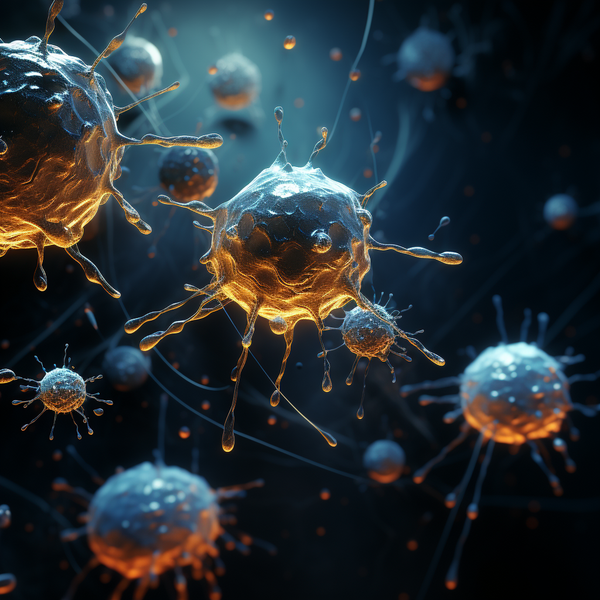
The Transformative Power of Full Moon Fasting: Unlock Autophagy and Renew Your Vitality
There's a mystical allure surrounding the full moon that has captivated humanity for millennia. Often associated with transformation, healing, and a deeper connection to nature, the full moon also provides an exceptional opportunity for fasting. But this is not just any fast; this is a Full Moon Fast, tapping into the primal power of celestial bodies to amplify the health benefits of traditional fasting. One of the most compelling of these benefits is autophagy—a process by which your body cleans out damaged cells and regenerates new ones.

The Elixir of Autophagy
Autophagy, originating from the Greek words for "self" and "eating," is essentially the body's way of cleaning house. When you fast, your cells initiate a waste disposal mechanism, breaking down dysfunctional proteins and organelles. This process is not just about detoxification; it's a reset button for your cellular health. It helps in anti-aging, cognitive function improvement, and potentially even cancer prevention.

How Long to Fast for Autophagy?
The initiation of autophagy varies from person to person based on their metabolism, but it generally begins after fasting for about 16 to 20 hours. To maximize the benefits of autophagy during a full moon fast, a 24 to 48-hour fasting window is recommended.

Moon Plus App: Your Cosmic Guide
To harness the unique energies of the full moon for your fast, it's crucial to know the exact phases of the moon. We recommend the Moon Plus App for its accurate moon phase tracking features. This comprehensive app offers real-time data, allowing you to align your fasting period perfectly with the full moon.

A Step-by-Step Guide to Full Moon Fasting
Step 1: Preparation
Before embarking on any fasting journey, consult with a healthcare professional, especially if you have underlying health conditions. Prepare mentally by setting your intentions for the fast.
Step 2: Initiation
Begin your fast 12 hours before the full moon reaches its peak. Utilize the Moon Plus App to pinpoint this moment.
Step 3: Fasting Period
Maintain a fast for at least 24 hours, extending to 48 hours if you're experienced. During this time, it's essential to listen to your body.
Step 4: Hydration and Nutrients
Yes, you can—and should—stay hydrated. Purified water with a pinch of Celtic salt can provide the necessary electrolytes. As for coffee, its natural diuretic effect can be counterproductive to hydration, so it's best avoided during the fast.
Step 5: Breaking the Fast
Once the fasting period is over, ease back into eating with easily digestible foods like bone broth or fruits.

What Can You Consume During the Fast?
Water and Celtic Salt
Hydration is crucial during fasting, and purified water with a pinch of Celtic salt not only hydrates but also supplies your body with essential minerals.

Coffee: Yay or Nay?
While coffee has its own set of benefits and is often considered acceptable during many types of fasting, the diuretic effect can compromise your hydration status. During a full moon fast, it's advisable to skip the coffee.
“If you’re serious about recovery, check out our deep dive into Hibernate's sleep-enhancing benefits'
Replenishing Nutrients After a Fast: Why Hydration & Amino Acids Matter
Breaking a fast requires gentle nourishment to ease digestion while replenishing essential nutrients. After extended fasting, your body is in a highly absorbent state, making it crucial to support muscle recovery, hydration, and electrolyte balance before reintroducing whole foods.
Dragon Fuel is the perfect intra/post-fast recovery drink as it contains:
✅ Essential amino acids (EAAs) – Support muscle preservation & prevent catabolism.
✅ Coconut water electrolytes – Rehydrate and restore electrolyte balance.
✅ Fast-absorbing formula – No stress on digestion, making it ideal for the first nourishment after fasting.
🔹 How to Use: Mix one scoop of Dragon Fuel in cold water as your first intake post-fast before introducing solid foods. This helps maintain energy levels and prevents the sudden insulin spikes that come with breaking a fast too aggressively.

Revitalizing Your Gut with Greens: The Best Way to Reintroduce Nutrients
After fasting, gut health is key. Your digestive system has been resting, making it essential to ease back into nutrient absorption with foods that promote gut lining repair and microbiome balance.
Red Dragon Greens is the ultimate first step to reintroducing nutrition post-fast:
✅ Digestive Enzymes & Probiotics – Support gut flora and ease digestion.
✅ Alkalizing greens blend – Helps balance pH levels and reduce post-fast acidity.
✅ Antioxidants & Adaptogens – Assist in reducing oxidative stress and inflammation from fasting.
🔹 How to Use: Start your first meal with one serving of Red Dragon Greens to prime your gut for whole foods, ensuring smooth digestion and maximum nutrient absorption.
Final Thoughts
By incorporating Dragon Fuel and Greens immediately post-fast, you ensure proper hydration, muscle preservation, and gut support before transitioning back to whole foods. These supplements provide a gentle, effective way to reintroduce nutrients, allowing you to maximize the benefits of fasting while avoiding digestive stress.
🔹 Next Steps: After your supplement phase, ease into whole foods with easily digestible proteins, healthy fats, and fibrous vegetables to sustain energy and recovery.
The Cosmic Bonus: Beyond Autophagy
While the science-backed benefits of fasting are significant, aligning your fast with the full moon elevates the experience into a transformative ritual. Fasting during this celestial event amplifies not just the physiological benefits, such as autophagy, but also taps into the spiritual and emotional dimensions of well-being. This cyclical alignment with the moon is thought to enhance intuition, enable emotional release, and deepen spiritual connection.
The Full Moon Fast goes beyond mere calorie restriction or detoxification; it provides an integrated approach to holistic health. By synchronizing your body's innate rhythms with the moon's phases, you engage in a unique confluence of science and spirituality. The full moon thus serves as both a temporal marker and a cosmic catalyst, offering unparalleled opportunities for renewal and transformation.

Frequently Asked Questions
Q1: What is Autophagy and how is it related to Full Moon Fasting?
Autophagy is a cellular process that cleans out damaged cells and regenerates new ones. In the context of a Full Moon Fast, autophagy is one of the health benefits that can be amplified due to the celestial event. Fasting during the full moon specifically aims to tap into this primal power to enhance cellular health.
Q2: What is the recommended duration for fasting to initiate autophagy during a Full Moon Fast?
The initiation of autophagy typically starts after 16 to 20 hours of fasting. For a Full Moon Fast, a 24 to 48-hour fasting window is recommended to maximize the benefits of autophagy.
Q3: How do I track the phases of the moon for Full Moon Fasting?
The Moon Plus App is recommended for accurate moon phase tracking. This app provides real-time data, helping you align your fasting period with the exact phase of the full moon.
Q4: Can I consume anything during the Full Moon Fast?
During the Full Moon Fast, you can consume purified water with a pinch of Celtic salt for hydration and essential minerals. Coffee is advised against due to its diuretic effects, which could compromise hydration.
Q5: What should I consume when breaking the fast?
Once the fasting period is complete, it's advisable to ease back into eating with easily digestible foods like bone broth or fruits.

Conclusion
The Full Moon Fast isn't just a fusion of science and spirituality; it's a transformative health practice that taps into the ancient rhythms of our planet and body. Whether you're a fasting novice or a seasoned veteran, aligning your fasting with the full moon can offer a unique path to rejuvenation and vitality.
Disclaimer: This article is intended for informational purposes only and should not be considered medical advice. Always consult with a healthcare provider before beginning any new health regimen.
High-Dose Creatine Supplementation: Does 20-30g Really Unlock Greater Gains?




Leave a comment